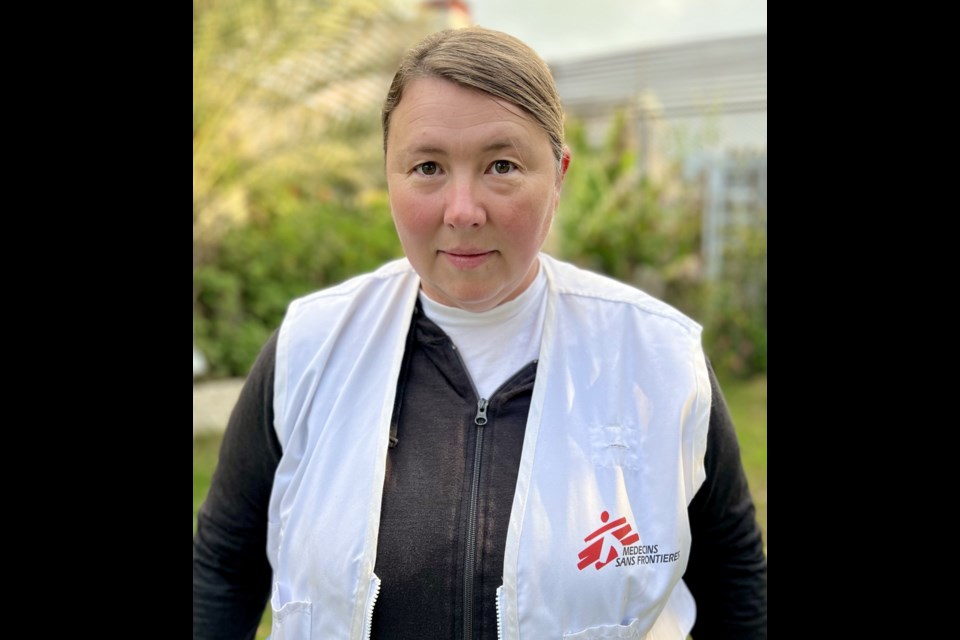THUNDER BAY — A city-born nurse working for Doctors Without Borders has returned from an assignment in Gaza describing living conditions for the people there as "just horrible."
Amy Leah Potter was raised and educated in Thunder Bay but has lived outside the country, including in the U.S. and the Middle East, since 2019.
The emergency room nurse recently completed a month of service in a makeshift clinic in southern Gaza near the Egyptian border, helping families displaced by Israel's ongoing retaliation for last October's attack on Israeli civilians by Hamas.
She spoke about what she experienced and witnessed during an interview Monday with TBnewswatch.
"One of the things I want people to know is it's so much worse than you can possibly imagine," she said.
"That's not through the fault of people in Thunder Bay or people in Canada that you don't get to see it. There's no reporters on the ground . . . So I don't think people realize how bad it is. I didn't realize how bad it was before I went."
Potter said colleagues with much more experience in the world's trouble spots than she has have all said conditions for civilians in Gaza are the worst thing they've ever seen.
She said the desperation among the people is the most vivid memory she brought back home with her.
"You would see them line up in queue for hours and hours for water, for food, for medicine . . . Everything is crowded. The living conditions are horrible, and there's just no hope. Every day, people would seem to get just a little bit more desperate, hoping for a ceasefire . . . And the worst part of it is, there's nowhere left to go."
Potter said communicable diseases are spreading at an increasingly rapid rate because of the poor living conditions.
"The people who are affected are not the enemy, for lack of a better term. They're not fighting back, they're not fighting Hamas, they're not fighting the IDF (Israeli Defence Forces), they're not fighting anyone. They're literally just trying to survive every single day."
For many of the nearly two million people trying to find somewhere to live, she said, there's an urgent need for medical care.
"It was deteriorating even just the month that I was there. The elderly patients or people who are chronically ill have had no access to any doctors, no access to any medications for so long. The pharmacies are empty. Things were starting to build up. A lot of people with diabetic wounds and stuff like that that we take care of, were not treated."
Potter described the case of a little girl who lost her family when their home was shelled in October.
"She was with an uncle when she came to visit us . . . She had a broken leg, and she had these big pieces of metal and trying to put her bones back together, but they had to flee the hospital they were being treated at. So she'd received no treatment since then, including physiotherapy. They didn't even have crutches for her so they were moving her around inside a baby stroller that didn't fit her."
For many Gaza residents, she said, there's not enough water to drink and shower, and not enough latrines.
"We started to see a lot of skin infections, a lot of scabies, a lot of lice and things coming up. That was hard to watch, because these are people who are professionals. These are doctors and bankers and people who before all this lived very successful lives. Now they're staying in tents, and this is everyone doing their absolute best. And through no fault of their own, this is now their new life."
Potter suggested that Thunder Bay residents can do two things to help.
"Obviously support for the NGOs [non-governmental organizations] that are able to work there is always appreciated, [Doctors Without Borders] being just one of many organizations that are there. And the one thing we just ask everyone to do is to continue to call for a ceasefire. This is really important. I mean, this is a population that will die without a cease fire. This is catastrophic."
On its website, Doctors Without Borders provides the following description of the facility where Potter worked:
We have established a primary health care mobile clinic inside two trucks in Al-Mawasi, where teams conduct about 400 consultations each day. Our team also conducts health promotion activities there to assess medical needs, particularly among elderly people. The MSF team also provides outpatient services, including general consultations, wound dressing, mental health care, and health promotion. Between January 20 and 26, we performed a total of 1,948 medical consultations, with 14 percent of conditions seen in children under five years old, and 26 percent seen in children between 5-14 years old. About one-third of patients had respiratory tract infections due to prolonged exposure to cold and rain and poor hygiene conditions, and 16 percent were diarrhea cases.
